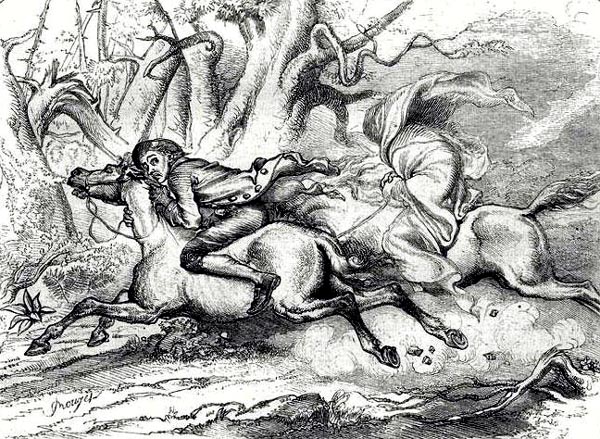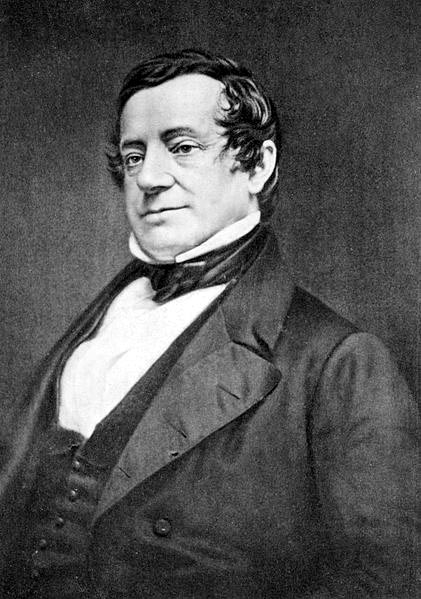Click to see Vol. I, Issue 11 of the newsletter in which this article first appeared.
Listen to the audio of this article!
Washington Irving (1783-1859) holds a unique place in American literature. He is considered to be the first American author to become a best-seller in Europe. Not only was his work well-known, but he inspired such 19th-century American greats as Nathaniel Hawthorne (author of The Scarlet Letter), Herman Melville (Moby Dick), Henry Wadsworth Longfellow (The Song of Hiawatha), and Edgar Allan Poe (numerous poems and macabre tales).
Irving's best-known works are stories like "Rip Van Winkle" (1819; see below) about a man who fell asleep in the woods for over 20 years; and "The Legend of Sleepy Hollow" (1820), about a "Headless Horseman" playing a prank on poor schoolteacher Ichabod Crane.
Despite the lighthearted nature of these popular tales, Irving was quite a serious author. He drew on local history for these stories, and was in fact as much a historiographer and biographer as he was a storyteller. He wrote biographies of great men like George Washington (in five volumes!) and Muhammad, as well as histories of Spain (he was in fact U.S. ambassador to Spain between 1842 and 1846).
Irving was in the first generation of his family born in America--his parents having come from the British Isles--and the youngest of 11 children (only eight of whom survived to adulthood). He was born the week that his fellow-citizens learned the American colonists had defeated the British, so his mother named him after the great hero of that war, George Washington. Once he became president, Washington lived in New York--the nation's capital at the time--where the Irvings also lived, and young Washington Irving was able to meet his namesake at age six.
His writing career began with letters written under a pseudonym and sent to the local newspaper. His letters were good enough to catch the publisher's eye, and he was soon writing as a professional.
He lived a long and productive life, over 20 years of it in Europe, and at age 76 died of a heart attack at his home, named "Sunnyside," in New York State.
Rip Van Winkle
 |
| A 19th-century actor as Rip Van Winkle |
In Irving's short story, "Rip Van Winkle," the titular character lives in a small Dutch town along New York's Hudson River, near the Catskill Mountains, shortly before the time of the American Revolution. Everyone loves him--his neighbors, children, even animals--for, though he is lazy, he is a genial soul. He does odd jobs for his neighbors, though his own farm is in disrepair. Sadly, he is beset by a nagging wife.
To escape her shrewishness, he spends more time than he should at the local tavern, named for the English King George III, where he and his friends enjoy a quaff of ale. Whenever his wife catches him there, he and his dog, Wolf, head off to go squirrel hunting in the hills.
One autumn day up in the woods, Rip and Wolf sit down to rest a spell as the sun prepares to set. As they start for home, Rip hears someone calling his name, and sees a short little man in antiquated Dutch clothing calling for help in hauling a keg of liquor.
As they proceed up the mountain, Rip begins to hear noises like thunder. They reach a hollow, where Rip sees the source of the sounds: a group of men with grizzled beards and dressed much like the first one are playing nine-pins.
No one says a word to Rip, who is puzzled at how the first fellow knew his name. He drinks some of the liquor from their keg and soon falls asleep. When he wakes, he discovers the men are all gone. Wolf does not answer when he calls; his gun has rusted almost to nothing; and his beard now reaches past his chest!
Bewildered, he heads back down the mountain, but when he reaches his village, he doesn't recognize a soul. The town itself looks different, and people are asking him how he has cast his ballot. Confused, he tells them he is a loyal subject of King George III, not realizing that the American Revolution has been fought and the country has become independent from England while he was asleep!
With difficulty, he finds his house and discovers it has fallen into ruins. His favorite inn, the King George III, has a new sign: it is now named for George Washington. He asks a group of men there about his old friends, and learns they are all dead--many of them died in the Revolution--or have moved away.
An old woman comments that he looks a lot like Rip Van Winkle, but everyone knows that Rip is a much younger man. It turns out this "younger man" is his son. Then a young woman appears and says she is old Rip's daughter (and young Rip's sister), Judith. After she tells the old man that her mother died of a fit of temper many years ago, Rip at last tells her who he is.
A historian confirms Rip's story about how he had wandered away, and explains that the men Rip saw were the ghosts of the crew of Henry Hudson, an early explorer for whom the Hudson River is named. They appear every 20 years to drink and play nine-pins.
Rip moves in with his daughter and continues his indolent ways, hanging out at the re-named inn and telling his story to anyone who will listen.
And to this day, when thunder rolls, the children of the area say Hudson's men are rolling the ball again.
The Legend of Sleepy Hollow
 |
| Ichabod Crane races against the Headless Horseman |
Irving's other famous story, "The Legend of Sleepy Hollow," is set in roughly the same time and place as "Rip," the era when Dutch and English people were living side-by-side in New York State.
And, like that story, it features another hapless fellow, one Ichabod Crane, a schoolmaster who has moved to the Sleepy Hollow area from Connecticut. He is tall and lanky, and more than just a bit of a scaredy-cat. This is not good, as Sleepy Hollow is well-known for its ghosts! The most famous of these is "The Headless Horseman," said to have been a soldier whose head was shot off by a cannonball in "some nameless battle" of the American Revolution. He often rides out at night, looking for his head. Or so they say.
In a typical arrangement for the time, the schoolmaster stays with different families in rotation. Crane helps out around the house or farm of whomever he's staying with. He also helps out with the children, which endears him to the town's women. It seems he's also a bit of a gossip--another thing the ladies love about him! He especially loves to hear stories from the older women, and of course these include stories of ghosts and the Horseman.
Ichabod is enamored of an 18-year-old girl named Katrina Van Tassel, daughter of a wealthy farmer. He hopes that by marrying Katrina he can better his station in life, and even become wealthy. But his rival is the town bully, Abraham Van Brunt, known as "Brom Bones." Brom tries to goad Ichabod into fighting, man to man, but the teacher is too clever to fall for that. So instead, Brom always plays pranks on Crane, to make him look foolish and perhaps to provoke him into a fight.
One autumn night, Crane attends a harvest party at the Van Tassels' farm, after which he proposes to Katrina. She turns him down, and--"heavy-hearted and crestfallen"--he heads toward his lodging on his old horse, "Gunpowder." Each time he passes the sites of the supposed hauntings he has been told about, he gets more and more fearful, until at last he meets a cloaked rider--whose head is not on his shoulders, but sitting on his saddle!
In a well-known feature of the Horseman's legend, he cannot cross the water in the stream that runs next to the Old Dutch Burying Ground. Every time he tries, he vanishes as soon as he reaches the bridge. Naturally, Ichabod turns his horse that way immediately and races against the specter, hoping to lose him at the bridge.
He makes it! But after crossing the bridge, he turns back, only to see the specter hurl its head directly at him! It strikes his own head, and he falls senseless in the dust.
The next morning, poor Ichabod is nowhere to be found. But near the bridge they find his hat, his horse's saddle, and the remains of a shattered pumpkin. The old women say he was taken by the Headless Horseman, and that his spirit is sometimes still seen in the area.
Later, Brom Bones marries Katrina.
PRACTICE:
Vocabulary: Match the words to their meaning. Correct answers are in the first comment below.
- antiquated
- biographer
- genial
- grizzled
- historiographer
- hurl
- indolent
- macabre
- namesake
- prank
- provoke
- pseudonym
- senseless
- shrewishness
- specter
- someone who writes people's life stories
- person whose profession is writing history
- with a dark, frightening tone or atmosphere
- two people (or things) that share the same name, especially when one is named after the other
- a trick; a practical joke
- a false or "pen" name, as when Samuel Clemens called himself "Mark Twain"
- throw with great force
- push someone into action
- unconscious
- ghost
- old-fashioned; outdated
- friendly; agreeable
- gray
- lazy
- bad temper; nagging
Questions to Answer: Answer the following questions in your own words. Suggested answers are in the first comment below.
- What "first" was Washington Irving famous for?
- What other writers were influenced by Washington Irving?
- How do we know Washington Irving was a serious author?
- What is "Rip Van Winkle" about?
- What is "The Legend of Sleepy Hollow" about?
Questions to Think About: These questions do not have "right" or "wrong" answers. They only ask your opinion.
- Why do you think Irving was so successful in Europe?
- George Washington was Irving's namesake, and he met him at age six. How do you think this might have affected his later success?
- How much do you think the serious nature of Irving's scholarship contributed to his success as a popular writer?



ANSWERS:
ReplyDeleteVocabulary: 1. K; 2. A; 3. L; 4. M; 5. B; 6. G; 7. N; 8. C; 9. D; 10. E; 11. H; 12. F; 13. I; 14. O; 15. J
Questions to Answer (suggested answers; yours may be written slightly differently)
1. Washington Irving is considered to be the first American author to become a best-seller in Europe.
2. Nathaniel Hawthorne, Herman Melville, Henry Wadsworth Longfellow, and Edgar Allan Poe were all influenced by Irving.
3. Irving was a historiographer and biographer as well as a storyteller.
4. "Rip Van Winkle" was about a man who fell asleep in the woods for over 20 years.
5. "The Legend of Sleepy Hollow" was about a prank played on a poor schoolteacher named Ichabod Crane.
Questions to Think About do not have any single correct answer. However, any answers you give should be supported by what you read or by things you know ("I think... because...").